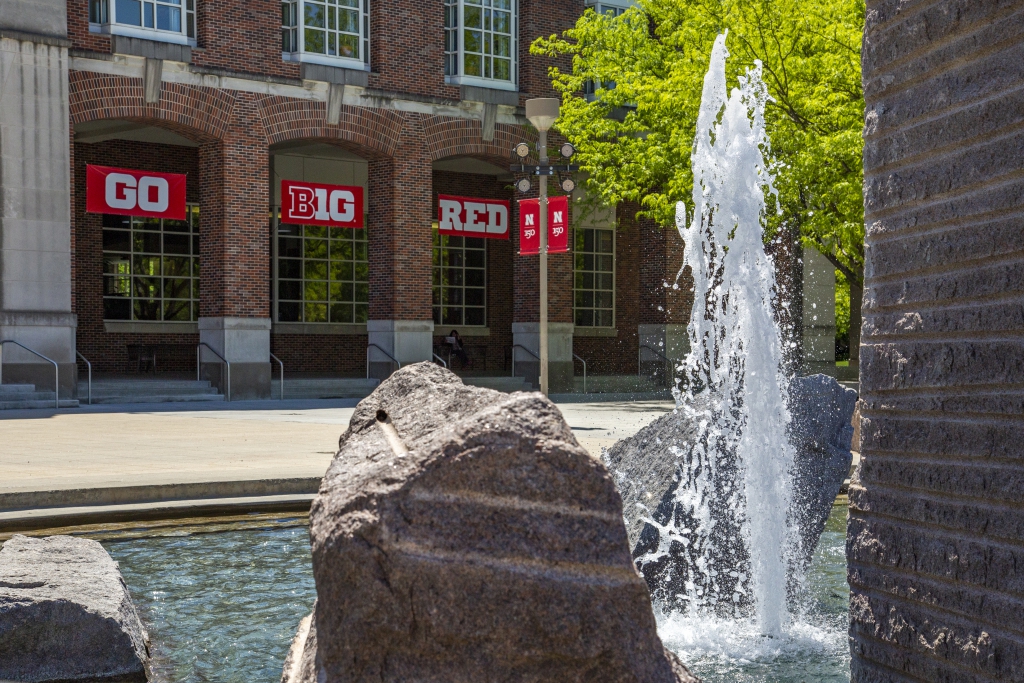Posted July 7, 2025 by Office of Research and Innovation
The Office of Research and Innovation and the UNL Research Council are pleased to announce several new internal funding awards made in response to proposals submitted in spring 2025.
R&I is supporting two new Arts and Humanities Research Enhancement Program Awards for 2025-2026. The program provides scholars with up to $15,000 to help faculty achieve short-term goals that, in turn, increases their competitiveness for external grants and/or increases the societal impact of their work, to ultimately set the stage for larger projects.
Arts and Humanities Research Enhancement Program recipients and projects
- Beth Dotan, Harris Center for Judaic Studies, “Art Integrations to Enhance the Nebraska Stories of Humanity”
- Jamie Reimer, Glenn Korff School of Music, “Robert Owens Centenary Festival”
Nineteen research projects will be supported in 2025-2026 through R&I’s Layman Award program. The Layman program funds work that enhances a researcher’s ability to obtain external funding to support prominent scholarship.
There are two tracks: the Layman Seed Program, which funds new projects by early-career faculty who are nontenured at the time of submission, and the New Directions Program, which funds tenured faculty who are branching into new research directions or need funding to support pilot or developmental work toward the next step in a funded research program. Awards of up to $10,000 per application are made possible by support from the University of Nebraska Foundation.
Layman Seed Program recipients and projects
- Nipuna Chamara, biological systems engineering, “Feasibility Study of Tropical Fruits and Vegetables Growing in AI-Agent-Controlled Environments to Enhance Food Security, Nutritional Diversity, and Local Economic Development”
- Edward Deehan, food science and technology, “Advancing Nutritional Microbiology Research for Common Marmosets (Callithrix jacchus)”
- Nirnimesh Ghose, computing, “Zero-Effort Eye-Tracking Based Two Factor Authentication”
- Minji Jeon, teaching, learning and teacher education, “Building AI Literacy in Middle School: A Pilot Study of an Instructional Unit Prototype”
- Makki Khorchani, natural resources, “Computer Vision-Based High-Frequency Livestock Tracking in Pasture Systems: Advancing Agricultural Research and Environmental Monitoring”
- Tian Li, architecture, “AI-Driven Dual-Scale Benchmarking for Building Energy Efficiency and Decision Support”
- Keeley MacNeill, natural resources, “Drivers of arsenic retention and transport in aquatic food webs”
- Kevin McMullen, English, “Documenting Walt Whitman’s Reconstruction-Era Writings”
- Milad Mohebali, educational administration, “Developing a Policy Framework for Wellbeing and Success of College Students Experiencing Basic Needs Insecurity”
- Brett Neely, management, “Digital Vigilance and Preemptive Countermeasures to Reinforce Responsible Mobile Sports Betting among At-Risk College Students”
- Keara O’Reilly, animal science, “Characterizing biomarkers associated with efficiency of feed utilization in beef cattle”
- Leslie Rault, entomology, “Pipeline to identify and functionally validate the role of ABC transporters for arbovirus replication in Aedes mosquitoes”
- Tamal Roy, mechanical and materials engineering, “Rapid Droplet Removal from Non-Wetting Surfaces Using Integrated Pyroelectric Materials”
- Qiuming Yao, computing, “Prototyping Computational Framework for Conserved Genes in Soybean Cell Types”
Layman New Directions Program recipients and projects
- Lydiah Kiramba, teaching, learning and teacher education, “Multiliteracies and Multilingual Students’ Engagement with the Science of Reading”
- Yunwoo Nam, architecture, “Uncovering Streetscape Risk Factors: Innovative GeoAI-based approach on Pedestrian Safety”
- Jay Reddy, veterinary medicine and biomedical sciences, “Messenger RNA vaccines for broad protection against rheumatic heart disease”
- Clemencia Rojas, plant pathology, “Dissecting regulatory processes controlling flowering under salt stress”
- LaMar Yang, electrical and computer engineering, “Developing Efficient Beamspace Algorithms for Reconfigurable Intelligent Surfaces (RIS) in 6G Wireless Networks”
Through its Visiting Scholar, Distinguished Lecturer and Symposia grants, the UNL Research Council supports: 1) visiting scholars whose research and scholarly activities are closely related to the research interests of the UNL community; 2) distinguished invited scholars who appeal to and interact with a large interdisciplinary segment of the university community; and 3) outstanding invited scholar(s) who will give symposia or colloquia of interest to a large interdisciplinary segment at the university.
Up to $800 is available to support visiting scholars; up to $3,000 for distinguished lecturers; and up to $3,000 for symposia.
Visiting Scholar, Distinguished Lecturer and Symposia recipients
- Katie Anania, art, art history and design
- Donna Anderson, history
- Kara Viesca, teaching, learning and teacher education
- Sandra Williams, art, art history and design






